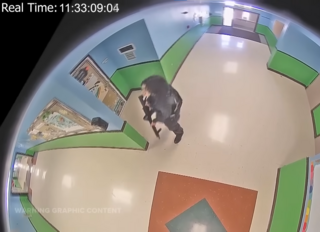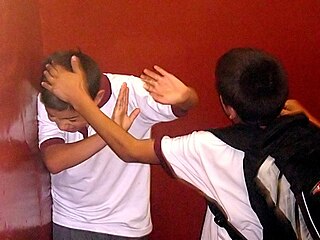Related Research Articles

A school shooting is an armed attack at an educational institution, such as a primary school, secondary school, high school or university, involving the use of a firearm. Many school shootings are also categorized as mass shootings due to multiple casualties. The phenomenon is most widespread in the United States, which has the highest number of school-related shootings, although school shootings take place elsewhere in the world. Especially in the United States, school shootings have sparked a political debate over gun violence, zero tolerance policies, gun rights and gun control.
Forensic psychology is the application of scientific knowledge and methods to assist in answering legal questions that may arise in criminal, civil, contractual, or other judicial proceedings. Forensic psychology includes research on various psychology-law topics, such as: jury selection, reducing systemic racism in criminal law, eyewitness testimony, evaluating competency to stand trial, or assessing military veterans for service-connected disability compensation. The American Psychological Association's Specialty Guidelines for Forensic Psychologists reference several psychology sub-disciplines, such as: social, clinical, experimental, counseling, and neuropsychology.
Legal psychology is a field focused on the application of psychological principles within the legal system and its interactions with individuals. Professionals in this area are involved in understanding, assessing, evaluating potential jurors, investigating crimes and crime scenes, conducting forensic investigations The term "legal psychology" distinguishes this practical branch of psychology from the more theory-oriented field of clinical psychology.
The University of Virginia School of Education and Human Development is a public school of education in Charlottesville, Virginia, United States. The School of Education and Human Development offers professional programs designed to prepare individuals for a variety of careers related to the practice of education. The current Dean of the School of Education and Human Development is Stephanie J. Rowley.
School violence includes violence between school students as well as attacks by students on school staff and attacks by school staff on students. It encompasses physical violence, including student-on-student fighting, corporal punishment; psychological violence such as verbal abuse, and sexual violence, including rape and sexual harassment. It includes many forms of bullying and carrying weapons to school. The one or more perpetrators typically have more physical, social, and/or psychological power than the victim. It is a widely accepted serious societal problem in recent decades in many countries, especially where weapons such as guns or knives are involved.
Park Elliot Dietz is a forensic psychiatrist who has consulted or testified in many of the highest-profile US criminal cases, including those of spousal killer Betty Broderick, mass murderer Jared Lee Loughner, and serial killers Joel Rifkin, Arthur Shawcross, Jeffrey Dahmer, Ted Kaczynski, Richard Kuklinski, the D.C. sniper attacks, and William Bonin.

School bullying, like bullying outside the school context, refers to one or more perpetrators who have greater physical strength or more social power than their victim and who repeatedly act aggressively toward their victim. Bullying can be verbal or physical. Bullying, with its ongoing character, is distinct from one-off types of peer conflict. Different types of school bullying include ongoing physical, emotional, and/or verbal aggression. Cyberbullying and sexual bullying are also types of bullying. Bullying even exists in higher education. There are warning signs that suggest that a child is being bullied, a child is acting as a bully, or a child has witnessed bullying at school.
Helen Cowie FBPS, PGCE, is Emeritus Professor in the Health and Social Care division of the Faculty of Health and Medical Sciences at the University of Surrey.

David Allen Wolfe is an academic, psychologist and author specializing in issues of child abuse, domestic violence, children and youth. His work includes the promotion of healthy relationships through school programs, with a major focus on the prevention of child abuse and neglect, bullying, dating violence, unsafe sex, substance abuse and other consequences of unhealthy relationships.
Cyberbullying is a form of bullying or harassment using electronic means. Since the 2000s, it has become increasingly common, especially among teenagers and adolescents, due to young people's increased use of social media. Related issues include online harassment and trolling. In 2015, according to cyberbullying statistics from the i–Safe Foundation, over half of adolescents and teens had been bullied online, and about the same number had engaged in cyberbullying. Both the bully and the victim are negatively affected, and the intensity, duration, and frequency of bullying are three aspects that increase the negative effects on both of them.
The United States Department of Justice defines school resource officers (SRO) as "sworn law enforcement officers responsible for the safety and crime prevention in schools". They are employed by a local police or sheriff's department and work closely with administrators in an effort to create a safer environment for both students and staff. The powers and responsibilities are similar to those of regular police officers, as they make arrests, respond to calls for service and document incidents.
Threat assessment is the practice of determining the credibility and seriousness of a potential threat, as well as the probability that the threat will become a reality. Threat assessment is separate to the more established practice of violence-risk assessment, which attempts to predict an individual's general capacity and tendency to react to situations violently. Instead, threat assessment aims to interrupt people on a pathway to commit "predatory or instrumental violence, the type of behavior associated with targeted attacks," according to J. Reid Meloy, PhD, co-editor of the International Handbook of Threat Assessment. "Predatory and affective violence are largely distinctive modes of violence."
According to the U.S. National Center for Education Statistics, school violence is a serious problem. In 2007, the latest year for which comprehensive data were available, a nationwide survey, conducted biennially by the Centers for Disease Control and Prevention (CDC) and involving representative samples of U.S. high school students, found that 5.9% of students carried a weapon on school property during the 30 days antedating the survey. The rate was three times higher among men than among women. In the twelve months preceding the survey, 7.8% of high school students reported having been threatened or injured with a weapon on school property at least once, with the prevalence rate among male students twice that as among female students. In the twelve months preceding the survey, 12.4% of students had been in a physical fight on school property at least once. The rate among males was twice the rate found among females. In the thirty days preceding the survey, 5.5% of students reported that because they did not feel safe, they did not go to school on at least one day. The rates for males and females were approximately equal.
David Philip Farrington, was a British criminologist, forensic psychologist, and emeritus professor of psychological criminology at the University of Cambridge, where he was also a Leverhulme Trust Emeritus Fellow. In 2014, Paul Hawkins and Bitna Kim wrote that Farrington "is considered one of the leading psychologists and main contributors to the field of criminology in recent years."

School security encompasses all measures taken to combat threats to people and property in education environments. One term connected to school security is school safety, which is defined as the sheltering of students from violence and bullying, as well as exposure to harmful elements such as drugs, guns and gang activity. Along with other public places, schools are at risk for invasion from outside as well as attacks from students or faculty because of the high traffic of potential assailants and availability of victims.

Active shooter training addresses the threat of an active shooter by providing awareness, preparation, prevention, and response methods.

Sameer Hinduja is an American social scientist. He serves as Professor of Criminology at Florida Atlantic University and co-director of the Cyberbullying Research Center. He has served as a Fulbright Specialist Scholar at Dublin City University and currently serves as Faculty Associate at the Berkman Klein Center at Harvard University. Hinduja is also the co-founder and Co-Editor-in-Chief of the International Journal of Bullying Prevention. He is an international expert in cyberbullying, sexting, sextortion, online and offline dating violence, digital self-harm, and related forms of online harm among youth. He has written eight books, including Bullying Today: Bullet Points and Best Practices, Bullying Beyond the Schoolyard: Preventing and Responding to Cyberbullying, and School Climate 2.0. His research publications have been cited over 25,000 times, and have appeared in such outlets as Journal of Adolescent Health, Journal of Youth and Adolescence, Journal of Interpersonal Violence, Computers in Human Behavior, and New Media and Society. Topics studied include empathy, psychological resilience, parenting, social and emotional learning, school climate, and well-being.

On the night of November 13, 2022, a mass shooting took place at the University of Virginia (UVA) in Charlottesville, Virginia, in which three people were killed and two others were injured. Four of the victims, including the three who died, were members of the UVA football team. The perpetrator, 22-year-old Christopher Darnell Jones Jr., was later taken into custody and charged with three counts of second-degree murder, as well as three counts of using a handgun in the commission of a felony. On November 20, 2024, Jones pleaded guilty in the shooting.
Gun violence is the leading cause of death for children and teens under the age of 20 in the United States. Since the Columbine High School shooting in 1999, there have been 417 cases of gun violence in schools as of September 2024. The frequency of school shootings increased dramatically after 2018, with a slight decrease in 2020 during the early part of the Covid-19 pandemic.
Scott Poland is a licensed psychologist known for his work on suicide risk prevention and school safety. At NOVA Southeaster University in Florida, he is a Professor in the College of Psychology, as well as the Co-Director of the Suicide and Violence Prevention Office.
References
- ↑ Bellows, Sierra (Spring 2008). "How Safe Are Our Schools?: Professor Dewey Cornell traces the roots of violence". Virginia Magazine. Retrieved 2019-01-11.
- 1 2 "Dewey Cornell". Curry School of Education and Human Development. 2017-08-10. Retrieved 2019-01-11.
- ↑ Mandell, Josh (2018-03-16). "School safety measures discussed at Charlottesville forum". Charlottesville Tomorrow. Retrieved 2019-01-11.
- ↑ Baars, Samantha (2017-06-14). "Threat assessment: UVA prof says schools are safe". C-Ville. Retrieved 2019-01-11.
- 1 2 3 "Dewey Cornell". University of Virginia School of Education and Human Development .
- ↑ "The Key to Preventing School Shootings: Dewey Cornell / Forensic Clinical Psychologist - Direct Talk | NHK WORLD-JAPAN". NHK .
- 1 2 "The Comprehensive School Threat Assessment Guidelines". University of Virginia School of Education and Human Development .
- ↑ Hutson, Matthew (7 June 2022). "Can Researchers Show That Threat Assessment Stops Mass Shootings?". The New Yorker .
- ↑ "Testimony outline". University of Virginia School of Education and Human Development .
- ↑ "Schools Are Desperate to Stop Violence. Will These New Guidelines Help? - EdSurge News". EdSurge . 22 March 2024.
- ↑ Solomon, Brent (1 February 2013). "Task force proposes school safety guidelines". WWBT .
- ↑ "Psychologists testify on campus safety". American Psychological Association .
- ↑ "Carneal Recalls 1997 High School Shooting Rampage". WAVE (TV) . 12 September 2002.
- ↑ Lamb, David; Braun, Stephen (14 December 2003). "Snipers' Motives Start to Emerge". Los Angeles Times .
- ↑ Webster, Donovan (2 September 2004). "The Story of John Muhammad's Partner in the D.C. Sniper Murders". Vanity Fair (magazine) .
- ↑ "He accepted a plea but for years a KY school shooter tried to get his conviction vacated". Lexington Herald-Leader .
- ↑ "Gun Violence: Prediction, Prevention, and Policy". www.apa.org. Retrieved 2024-12-04.
- ↑ Prevention of Bullying in Schools, Colleges, and Universities. American Educational Research Association
- ↑ "Student Threat Assessment as a Safe and Supportive Prevention Strategy" (PDF). National Criminal Justice Reference Service .
- ↑ "Welcome To Our New Research Advisory Board - Born This Way Foundation". Born This Way Foundation. 23 August 2016.
- ↑ "Call For Action to Prevent Gun Violence in the United States of America | UVA School of Education and Human Development". education.virginia.edu. Retrieved 2024-12-04.
- ↑ "School Safety: Research on Gathering Tips and Addressing Threats". National Institute of Justice .
- ↑ "Bullying linked to lower school achievement". The Washington Post .
- ↑ "We could prevent school shootings if we really wanted to". NBC News . 8 December 2019.
- ↑ "Virginia Study Finds Increased School Bullying In Areas That Voted For Trump". National Public Radio .
- ↑ "Q&A: Preventing School Violence by Appropriately Responding to Threats | UVA School of Education and Human Development". education.virginia.edu. 2024-10-10. Retrieved 2024-12-04.
- ↑ "UVA Researchers Create Toolkit To Support School Safety". news.virginia.edu. 2024-03-07. Retrieved 2024-12-04.
- ↑ "School Threat Assessment Toolkit". National Center for School Safety. Retrieved 2024-12-04.
- ↑ Blad, Evie (24 July 2023). "A State Mandated School Threat Assessment. Here's What It Meant for Students". Education Week .
- ↑ "Statewide Public Middle School Climate Report Finds Students, Teachers Feel Safe, Respected". University of Virginia .
- ↑ "Authoritative School Climate Survey | UVA School of Education and Human Development". education.virginia.edu. Retrieved 2024-12-04.
- ↑ "Dr. Dewey Cornell on how school-based threat assessment improves school safety". Police1. 17 March 2023.
- ↑ "Gifted children: The impact of positive labeling on the family system". American Psychological Association .
- ↑ "Sandy Hook Promise" (PDF). ESCNEO.
- ↑ "Student threat assessment as a standard school safety practice". American Psychological Association .